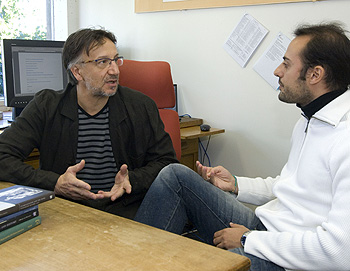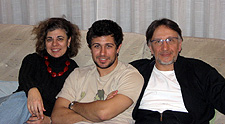The linguistic world’s loss was economic’s gain.
It wasn’t until Michele Boldrin was 24 and had already dabbled in law and linguistics that he realized it was economics that intrigued him most. The only downside to pursuing a doctorate in economics was that it meant leaving his native country, Italy, three years later.

“My mind was set on economics,” says Boldrin, Ph.D., the Joseph Gibson Hoyt Distinguished Professor in Arts & Sciences. “The quality of Italian higher education had been deteriorating for a while, and the difference in quality with the best American places was so big that it was a natural choice to come to the United States.
“If you want to study economics, you had to move to the States then, and you still have to now,” he says. “I am very attached to my Italian identity, but I never could have been an economist had I stayed home.”
Boldrin’s strong ties to his homeland can be attributed in part to his years in Liceo (high school). The practice in Italy is for students to stay with the same cohort of about 25 people throughout the five years of high school.
“I still feel very fond of that whole period and like to tell people about it,” says Boldrin. “The class I was in for five years managed to develop some special bonds that have kept us together until now. Thirty years later, we still meet whenever possible to party, talk politics and mercilessly poke fun at each other, like we have always done.”
There was only one downside: “It was an all-male class. I don’t know why it ended up like that,” Boldrin says. “As a result, it was a very macho class, very athletic, and yet there was an intellectual passion in our class, which shows in the professional accomplishments of many of its members.”
|
Michele Boldrin
Family: Wife Emanuela; son Niccoló, 23 Education: B.S., economics, Universita di Venezia; M.A., Ph.D., economics, University of Rochester Childhood home: Venice, Italy Adult home: All over the world Favorite city: Madrid. “It’s a city that manages to have everything,” Boldrin says. “It’s a beautiful city, although not like Paris or Rome. It’s not as international as London, it doesn’t have as good weather as Los Angeles, it’s not as vibrant as New York, and there’s not as much of a nightlife as Tokyo. Madrid is second to all of those places, and I like that. It’s a place that has a lot of neighborhood life, even in the center of the city. You know the people at the restaurant, and they know you and remember you.” |
During his last two years of Liceo, Boldrin’s class lobbied for the addition of women. That plan didn’t pan out, but Boldrin still managed at that time to meet his future wife, Emanuela, even if it was only several years later that Boldrin won her heart.
An intellectual journey
Because of the political situation in the world, much of Boldrin’s intellectual ardor was mixed with the politics of the times. It was the 1970s, the Vietnam War was still being fought and debated, and the long intellectual wave of “May ’68” was in the air.
Throughout his high school years, his mandatory service in the Italian army and well into his years as a university student, Boldrin and his peers questioned issues of public policy and debated whether the market system works. Those concerns and his interest in the socio-economic topics eventually drew him to pursue an academic career in economics.
After earning his doctorate from the University of Rochester in 1987, Boldrin’s academic career took him across America — and around the world. He was a postdoctoral fellow at the University of Chicago and then went on to teach at the University of California, Los Angeles; Northwestern University’s Kellogg School of Management; Universidad Carlos III de Madrid and the University of Minnesota.
Boldrin spent 10 years as a member of the external faculty at the Santa Fe Institute in Santa Fe, N.M., from its inception in 1987. He also is a Fellow of the Econometric Society and a Research Fellow at CEPR (London) and FEDEA (Madrid).
Boldrin also spent time as a visiting faculty at a number of other institutions around the world. In the fall of 2006, he joined the faculty at WUSTL, enticed by the excitement of the growth in the University’s economics department.
Emanuela and their son Niccoló, 23, were with him throughout his moves. Boldrin says that when he made the initial decision to move to the United States to pursue his doctorate, Emanuela had no problems making the move as well.
“She liked the idea of trying out life in the States,” Boldrin says. “But because she had to put up with my moving around so much, she’s ended up doing a variety of different things, switching career paths at least three times.
“She was a theater and literature major back in Italy, where she graduated from the University of Bologna,” he says. “While we were in Los Angeles, she received an MBA from the Anderson School at UCLA and worked at the L.A. International Film Festival. After that, she was a banker in Chicago, a research foundation’s manager in Madrid and the founder of the Italian Cultural Center in Minneapolis. Since moving to St. Louis, she teaches Italian and Spanish here at WUSTL, in the Romance languages and literatures department.”
The cost of education
In a way, Boldrin’s academic interests mirror his migratory life; he did not settle into just one area of study. He has delved into a variety of subspecialties, including growth theory, business cycle theory and public policy.
His most recent work examines the cost of education and pensions and suggests a way to pay for both by linking them together.

Boldrin says that in the same way that younger generations in traditional families take care of their elders as a kind of “repayment” on their parent’s investment, so, too, can the United States invest in the educational needs of its younger generations. The accumulated debt would be paid to retirees by the beneficiaries of the investment when it comes due.
The key is to virtually do away with paying for high schools and college education through general taxation and instead to consider it as an investment in the human capital of those attending high school and college (who will be “borrowing” from the older generations to afford such investment) and, at the same time, to stop funding public pensions through the social security tax.
“The cost of education should be treated as an accumulation of debt toward the older generations,” Boldrin says. “From the time students start kindergarten until the time they finish their education, students are, in a certain sense, taking on debt toward the older generation, a debt that should be repaid when they enter the workforce.
“The debt could be paid off like a mortgage, in fixed amounts every month or all at once, whichever is more convenient,” he says. “Either way, that money would be an individual’s social security contribution. The proceedings so obtained would go toward paying part of the public pensions.”
‘He questions everything’
This kind of research exemplifies Boldrin’s unique way of thinking, says David Levine, Ph.D., the John H. Biggs Distinguished Professor of Economics in Arts & Sciences. It’s what makes him stand out as an economist.
“Michele definitely has his own way of thinking about things,” Levine says. “That’s one of the valuable things for collaborators. He also has problems with authority, but in the line of work he’s in, that is probably a good thing. In research it is good to challenge conventional wisdom. He questions everything around him, and that’s an important ingredient to him and to our relationship.”
Levine and Boldrin met 20 years ago when they were both professors at UCLA. They’ve remained friends and co-researchers despite Boldrin’s peregrinations around the globe. In fact, the two decided jointly to accept positions at WUSTL in 2006 because of the economics department’s goal of increasing the size and quality of its faculty.
“There is potentially something very exciting going on in the economics department here, and we knew we could be a big part of that,” Levine says.
For Boldrin, playing a role in the department’s growth has become one of his goals.
“For both David and me, we were working in great departments with wonderful colleagues, and we had turned down top places in the past,” he says. “It wasn’t about the money; the excitement of helping to develop a new department is what really drew us to WUSTL.”
Boldrin says it is a challenging quest because economists tend to be a conservative bunch, and economics is a field not very responsive to self-criticism. The department’s vision is to promote a conception of economics as an interdisciplinary science, where the basic tools of economic analysis interact with those of other sciences and are applied to everything human beings do when acting “socially” — that is to say in interaction with other human beings.
“This is probably an unconventional way of thinking,” Boldrin says. “But not so much, as many scholars have already theorized it in one form or another, even if very few have actually seriously attempted it.
“At WUSTL, it’s part of an intellectual tradition that goes back to Doug North (the Spencer T. Olin Professor of Arts and Sciences),” he says. “Trying to conceive of econ as interdisciplinary is a great challenge, and we have no illusions that this will be an easy process. But it is an exciting one, and that is why I have no problems telling my colleagues that I think I am here for the long run.”